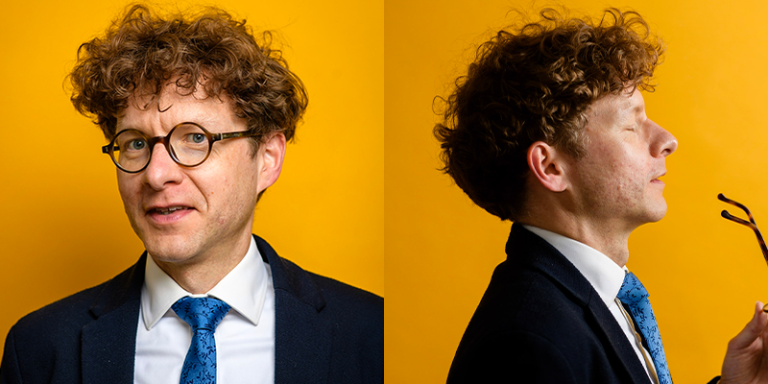How can we fix our democracy?
6 August 2023
We talk constitutions, citizens assemblies and public expectations with Alan Renwick

This article originally appeared in the UCL Policy Lab Magazine.
It’s no secret that voters are frustrated by politics. In recent years a deep disconnection with our democratic institutions and structures has led to political earthquakes that continue to shake the foundations of Westminster.
From Scottish Independence to power-sharing in Northern Ireland, the UK’s relationship with the European Union to lack of trust in politicians, Britain remains a democracy under challenge.
But these challenges have also given birth to ambitious new thinking on renewing our democracy, our shared institutions and improving decision-making.
Alan Renwick is no stranger to these challenges. As one of the leading experts on the British constitution, he has brought new perspectives on how we breathe life into British democracy. And, most importantly, rebuild our faith in it.In his recent inaugural lecture at UCL, he set out his own, very personal answer to the question ‘How can we fix our democracy?’
When I sat down with him in Bloomsbury, he was keen to make clear that, although most people do not obsess over constitutional process and procedure, that does not mean they are not passionate about how politics is designed and organised.
“People do care about the health of our democracy. Above all, they care about honesty in politics,” he insists.
Although this may feel a perennial problem for politics the world over, he argues that two things have changed. One is that public expectations have shifted. We no longer see ourselves as passive bystanders, but as active and constant participants, through new technology and new ways of organising.
“If you go back and read a newspaper from the 1950s, the public just aren’t there,” he says.
“The public would elect their representatives, and their representatives would get on with it. The idea that there might be a dialogue going on between elections just wasn’t even considered.”
Today, Renwick says, that distance between politics and the people has been removed. We have 24-hour news coverage and 24 hours of opinions being asked for and shared in the media and online, giving the public the sense they should be able to shape, or at least have a say, in events.
“But our politics simply is not designed to allow this kind of ongoing participation, so shifting public expectations are not being met.” And that, says Renwick, “is feeding further disillusionment.”
Meanwhile, politicians increasingly find themselves stuck between the need to cut through in a noisy debate and the demand for practical solutions. That is fuelling the second change: the discourse of politics in getting coarser and more superficial – which only turns people off even more. “And so you get this kind of negative spiral in the discourse around people feeling disaffected and disillusioned.
It is not just the public who feel frustrated. As Renwick puts it: “Politicians feel they have to perform and talk to the gallery to an ever-greater degree, which gets in the way of delivering workable policies.”
But if our politics feels stuck, trapped between the policy challenges and the political discourse, how can we break free?
Renwick has been leading work to explore new models of deliberative democracy – a way of working that enables members of the public to play an active role in democracy that complements the role of elected representatives and helps encourage more constructive policy dialogue.
“We know that, in themselves, processes like citizens’ assemblies work really well for having a thoughtful, considered policy discussion among the full range of the public and coming up with solutions that make sense,” he says. “The challenge we’re now working on – and beginning to solve – is how to integrate such processes into the wider system of representative democracy. We can fix our democracy only if citizens’ assemblies, elected institutions, the media, and the wider public are all playing their different parts effectively.”
But how do universities as institutions for ideas and learning figure in Renwick’s ideas for democratic renewal?
“There’s not enough careful consideration of what the evidence shows or how we can evaluate different perspectives and come to an overall view,” he says. “Universities ought to be great places for doing that kind of work and encouraging more thoughtful discourse about issues.”
This is what Renwick works towards today, both in the UCL Constitution Unit and as an active collaborator with the UCL Policy Lab. He is helping to work through new ways to overcome the shared challenges we face.
This belief in ideas and collaboration sits at the heart of what Alan Renwick does but also who he is. At the start of his recent lecture, Renwick spoke about growing up in Wick, on the very northerly edge of Scotland, and of those who inspired him to start to think about politics.
He mentioned his teachers, his parents and the political figures who shaped that part of Scotland. All, in their own way, seeking to build on what’s already good and pass on something better.
Those names and faces from his past are still reflected in his work today and the passion that drives him: “If you believe in the importance of a well-functioning democracy, then you have to work out how to nudge that system in a healthy direction.”
From deliberative democracy to improving standards in public life, he is carrying on that long tradition. His ideas and energy could be key for all of us who care about politics and improving our society.
 Close
Close

